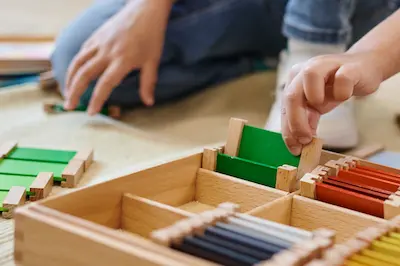Today, the amazing Montessori method has taken over the world, with 22,000 Montessori schools in 110 countries.
The Core Ideas of the Montessori Method
Montessori schools are rooted in the idea of developing the child’s own initiative and natural abilities, especially through practical play. It is based on the following concepts:
Follow the Child!
This simple mantra is at the core of a Montessori education. By matching a child’s intellectual capabilities with tailored activities, it is possible to both stimulate and motivate a child to explore at their own pace and, as a result, develop their own initiative and passion.
Freedom of Choice in Work
Children are encouraged to choose their own work based on their abilities and inclinations. This marries the natural curiosity of children with a feeling of ownership and engagement. Instead of being passive observers, they become active participants in their education.
Freedom of Movement
Children are free to move around their classroom to get materials for their activities. This freedom of movement develops a feeling of peace and control in the child. It nurtures their sense of independence as well as self-discipline and makes them feel respected.
Educational Manipulative Materials
Maria Montessori designed manipulative materials that entice and encourage children to explore with their hands and learn at the same time. They are sensory pleasing and interesting, serving as concrete, real-life models of more abstract concepts to be learned by the child.
Multi-Age Classrooms
Montessori schools use multi-age classrooms because children learn best in an environment that is similar to their home. Younger children gain confidence and knowledge from watching older children. Older children, on the other hand, develop leadership skills and feel accomplished.
Life Skills
Montessori believed that the essence of independence is learning to take care of oneself. This translates to real-life activities in the classroom, such as scooping, pouring, sweeping, sewing, gardening, conflict resolution, and encouraging independence, and responsibility in a child.
Creating Peace through Education
Maria Montessori stated: “Creating peace is the work of education." She incorporated lessons to show children peaceful resolutions to their problems. She saw children as mankind's hope for the future, and as a result, she was nominated for the Nobel Peace Prize in 1951 and 1952.
Multicultural Education
Montessori incorporated lessons about the world and its cultures. She believed that children would be the future peacemakers. She wanted children to respect people all over the world.
More Information about Montessori and Child Development
Find a Montessori School in the Boston Area here >
CDC Child Development Basicss >










